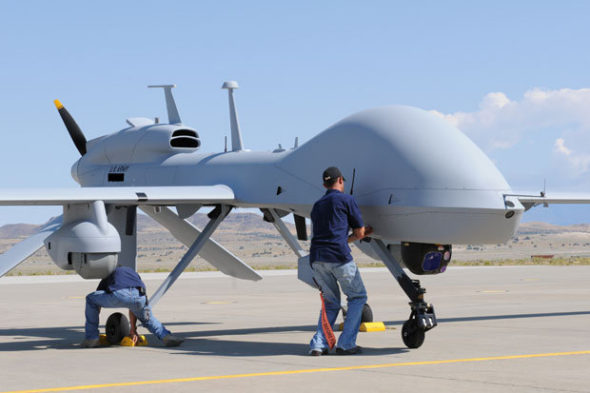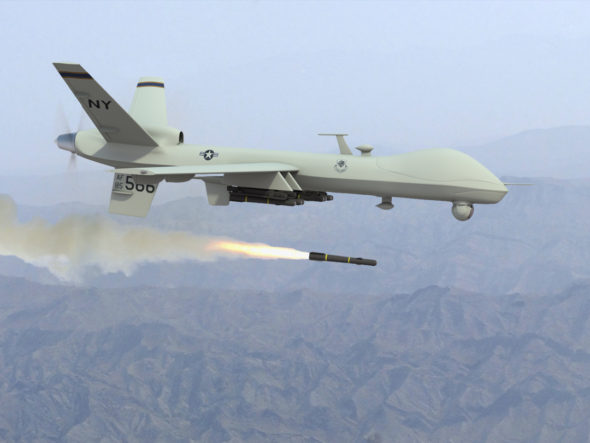Obama administration to allow allied countries to buy military drones
Daily News Article — Posted on February 20, 2015

U.S. military drone
(by W.J. Hennigan, Los Angeles Times) – The Obama administration unveiled a new policy Tuesday allowing foreign allies to buy military drones, a move that could have potentially far-reaching implications for global security partnerships and the U.S. aerospace industry.
For years, American drone makers have been eager to feed the international appetite for the high-tech unmanned aircraft that have reshaped modern warfare, but U.S. export regulations have prevented them from doing so.
The administration’s new policy, which was completed after years of internal review by the Defense, Commerce, and State departments, is designed to allow those exports while building in protections against misuse of the technology.
U.S. officials suggested the drone sales could become a new tool for expanding American influence overseas.
“We are interested in building strong and capable international partners,” said a senior State Department official, who was not authorized to speak publicly on the policy. “Now we have established a process that will help build those partnerships through the acquisition of this technology.”
The change of policy could result in a windfall for the aerospace industry in Southern California, where much of drone manufacturing is centered. In its latest assessment of the industry, aerospace research firm Teal Group Corp. estimated that drone spending would almost double to $11.5 billion in 2024.
Northrop Grumman Corp. and Lockheed Martin Corp. assemble drones in Palmdale. In Poway in San Diego County, General Atomics Aeronautical Systems Inc. builds the armed Predator and Reaper drones that have become the centerpiece of U.S. counterterrorism missions.
But the prospect of U.S. sales of lethal drone technology to other countries has already proved controversial. Critics say the aircraft lower the threshold for the use of military force by allowing countries to attack without fear of risking pilots. They point to President Obama’s use of drones to kill terrorism suspects in a broad arc of countries from Pakistan to North Africa.

Reaper drone firing missile
Defenders of the sales contend that other countries, including Israel, Russia and China, manufacture military drones and have fewer compunctions [reluctance] about selling them. Refusing to do so hurts the American aerospace industry and denies the U.S. any influence over how other countries use the technology, supporters of military sales say.
Britain is currently the sole country that flies American-made drones that are armed.
The U.S. already sells fighter jets, bunker-busting bombs and high-powered ship-mounted guns to a wide variety of countries. But drone sales, except for the smallest unmanned aircraft, have been largely prohibited by a 1987 international agreement called the Missile Technology Control Regime. The agreement was reached initially by the United States, Canada, France, Germany, Italy, Japan and Britain and now includes 34 countries.
A few exceptions for sales have been made over the years, but the agreement put restrictions on the export of unmanned aircraft that can carry 1,102 pounds for more than 186 miles at a time. Unarmed drones smaller than these are allowed to be sold.
The primary focus of the agreement was to control the spread of ballistic missiles and other weapons capable of mass destruction during the Cold War.
Defense companies [makers of military weapons/equipment] have repeatedly complained that the restrictions are outdated and have caused the U.S. to lose potential customers to nations that have fewer restrictions on their arms industries.
The State Department said that although the new export policy would facilitate sales of armed drones, any sales, which would need congressional approval, would be made through the government-to-government foreign military sales program.
Each country eager to buy U.S.-made drone technology would also be required to agree to “end-use monitoring and potential additional security conditions.”
Those restrictions would be designed to limit potential misuse of drones, such as attacks against a country’s own civilian population.
The administration’s new policy is sure to draw scrutiny from critics who worry about the technology falling into terrorists’ hands or being used by repressive governments.
In a statement, the State Department recognized the need to keep a close watch.
“The United States is committed to stringent standards for the sale,” it said. Any sale will be reviewed “on a case-by-case basis.”
Reprinted here for educational purposes only. May not be reproduced on other websites without permission from the Los Angeles Tmes. Visit the website at latimes.com.
